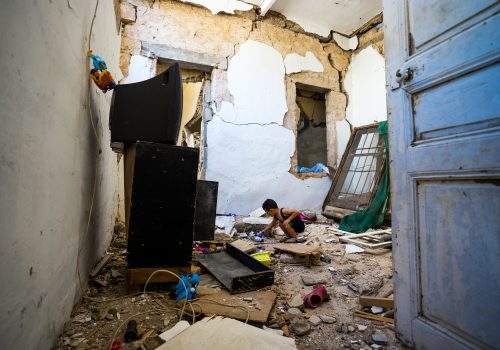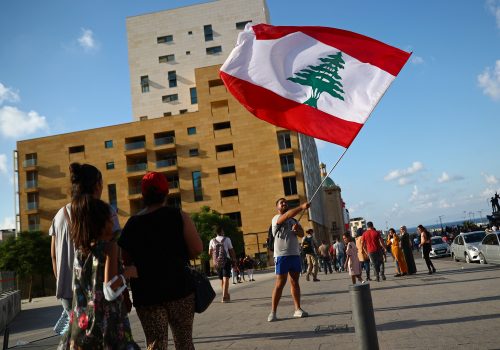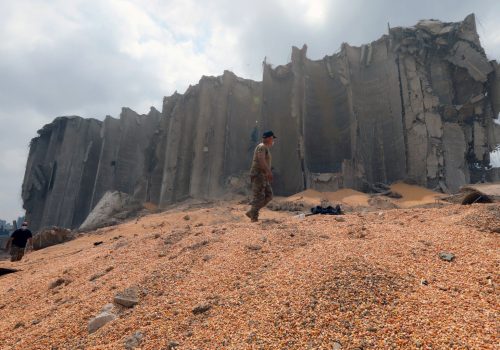A reform scenario for Lebanon
It has by now become universally accepted that there is something rotten in the state of Lebanon. The August 4 explosion at the port in Beirut was the culmination of a corrupt sectarian and feudal system heading for a precipitous fall since the end of the civil war in 1990. It was obvious, in 2015, that the state had failed to provide even the minimum required services to keep the population healthy—let alone thriving—when garbage mounted in streets all over the country. After failing to fix the electrical grid and declining to provide an uninterrupted supply of drinking water for all homes, the banking system collapsed in the fall of 2019 and the state went bankrupt. Successive crises in government formation have only pointed to the inability of Lebanon’s political elite to address the roots of the problem. Instead, they continue to busy themselves with the old musical chairs game—bickering on which sect holds on to which cabinet seats and for how long.
The Lebanese system is defined in a formal constitutional document first written in 1926 and an informal, though equally binding, National Pact that was agreed to by Lebanese leaders in 1943. Both will need to be radically altered for genuine reform to take place. The constitution, elegantly setting forth the republic, its land boundaries, and its government institutions, has a built-in mechanism for amendments. A quorum of two-thirds of parliament must be physically present in the parliament building and a majority of two-thirds of its members must approve the provision. This means, of course, that prior discussions among party and bloc leaders are essential to establish common ground on the need for change and the constitutional provisions that will be in contention or up for voting on in parliament. The following topics must be a part of the discussion for any attempt at serious reform.
Legislative reform: An upper house of parliament was formally suggested in the Taif agreement in 1989 but was never placed on Beirut’s reform agenda. Otherwise, the agreement held on to sectarian-based politics, albeit reshuffling numbers between the sects. It is essential, if sectarianism is to be abolished, that there is a gradual separation between religion and politics, since sectarianism is rooted in the hearts and voting traditions for a large percentage of the population. Consequently, an upper house—akin to the British house of Lords—could be established to house sectarian representation, hence allaying the fears of those who are worried about being marginalized. The same proportions currently used in parliament would then be transferred to the upper house, with circumscribed functions and powers. The lower house would retain for itself fiscal, budgetary, and security matters and its membership would be open for political parties and independents regardless of their religious and/or sectarian affiliation.
Electoral reform: A new election law would have to be approved before any new elections are organized. The new law should be custom-made to encourage independent candidates and new secular parties, which have been disadvantaged by current election laws. Proportionality in multi-member districts, for example, must be enshrined so that new contestants and parties are guaranteed representation even when they fail to acquire a majority in a particular district or if they shun joining larger blocs in order to be on a winning ticket.
Truth and Reconciliation: Calls for the accountability of corrupt officials are certainly well justified, since most of the foreign currency in banks went to the Lebanese Central Bank to pay off government loans and obligations—much of which was lost either through mismanagement or outright corruption. The difficulty of punishing corrupt leaders in Lebanon is twofold: it is impossible to pick who to punish since most of the elite are likely guilty and, if pressured, would certainly not assist in implementing any reform measures. To move ahead, one idea would be to use a specifically tailored truth and reconciliation commission, as has been used in countries that transitioned from abusive dictatorial regimes to democracies—South Africa being one example. The truth needs to be told lest history repeat itself in any new system of government. However, it may be futile to go down a dangerous rabbit hole of crime and punishment at this point. Decrying the mistakes of the past, learning from them, and moving on with minimal prosecutions may be the best bet.
Board of Investments: Lebanese anti-corruption laws are adequate for as far as they go. On paper, corruption is outlawed and those who steal or abuse public funds can end up in the courts. The trouble lies in the court’s slowness in actually finding evidence on major acts of fraud and finding judges who are not themselves corrupt or intimidated by the accused. Of the many ways to embezzle funds in Lebanon, the most popular is perhaps to skim off the top of foreign investments and to receive kickbacks as a price for awarding contracts. A board of investment on which international experts sit, along with local financial experts, would go a long way towards making it difficult for this particular act of thievery to take place. The board’s job would be to supervise the bidding process on government contracts and to ensure that the awarding of contracts and the disbursement of public funds are done transparently
Dealing with Hezbollah: Finally, Lebanese Hezbollah, the elephant in the room, poses a problem that must be confronted with a solution that all Lebanese factions, including civil society leaders, can agree on. There is no doubt that this party, formally launched in 1984 as a response to the 1982 Israeli invasion, has grown beyond its original raison d’être as a “resistance force.” With an army that ranks among the top military forces in the region, a vast social welfare network, and a political arm that, along with its allies, currently forms a majority in the Lebanese parliament, Hezbollah is a state within a state. More troublesome is the fact that the party makes its decisions and takes action inside and outside of Lebanon independently, despite the fact that its actions can certainly have a serious impact on the rest of the country.
The National Pact of 1943 is partly to blame for the current stalemate over Hezbollah’s arms, status, and role in Lebanon and the region. The country’s political and sectarian elite have long believed in—if not always acted according to—the principle of consensus, in order to prevent any one party or sect from feeling submerged under the will of others; hence, why they’ve tried to live by the motto of “no victor no vanquished” in Lebanese politics. Applied to everything—from Lebanon’s independence down to who collects the kickbacks from garbage collection—the quest to build total consensus can have a crippling effect on decision-making. Leaders of the principal factions and, therefore, the majority of Lebanese are now evenly split on Hezbollah’s legitimacy. The alliance of President Michel Aoun, Speaker Nabih Berri and Hezbollah Secretary-General Hassan Nasrallah includes a majority of the Shia sect in Lebanon and arguably half of its Christian population. This half of the country believes there continues to be a critical need for a resistance force to oppose not only Israel but also an extreme Islamist force that could have taken power in Syria and Lebanon were it not for Hezbollah, which—working with full Iranian support—thwarted al-Qaeda and the Islamic State of Iraq and al-Sham (ISIS) in Iraq in addition to Syria and prevented attacks inside Lebanon. The other half of the country, including a majority of Sunnis and the other half of the Christian population, believes that the party, through its armed forces, intimidates its way into domination of the Lebanese state and exposes the country to constant dangers by dragging it into wars undeclared by the state itself.
With nothing in the constitution about a resistance force, the National Pact would have to be amended, either abandoning the consensus principle in favor of a democratic rule by majority or an agreement on who should deal with regional threats to the country and how. While everyone agrees on the need for adequate defense, there clearly is no agreement on who should wield weapons and under whose authority. Nothing short of a new founding national convention can put the Lebanese system on the table to set new common standards for institutions and the foreign policy direction of the country. It is literally coming down to either a new social contract for Lebanon or war. The fifteen-year civil war (1975-1990) was a national trauma; a second round of that would devastate what’s left of the country and its population.
Nabeel Khoury is nonresident senior fellow at the Atlantic Council’s Rafik Hariri Center for the Middle East.
Sign up for all the latest updates!
Sign up for the MENASource newsletter, highlighting pieces that follow democratic transitions and economic changes throughout the region.
Image: Lebanese Parliament Speaker Nabih Berri heads a general legislative session at UNESCO Palace in Beirut, Lebanon September 30, 2020. REUTERS/Mohamed Azakir


